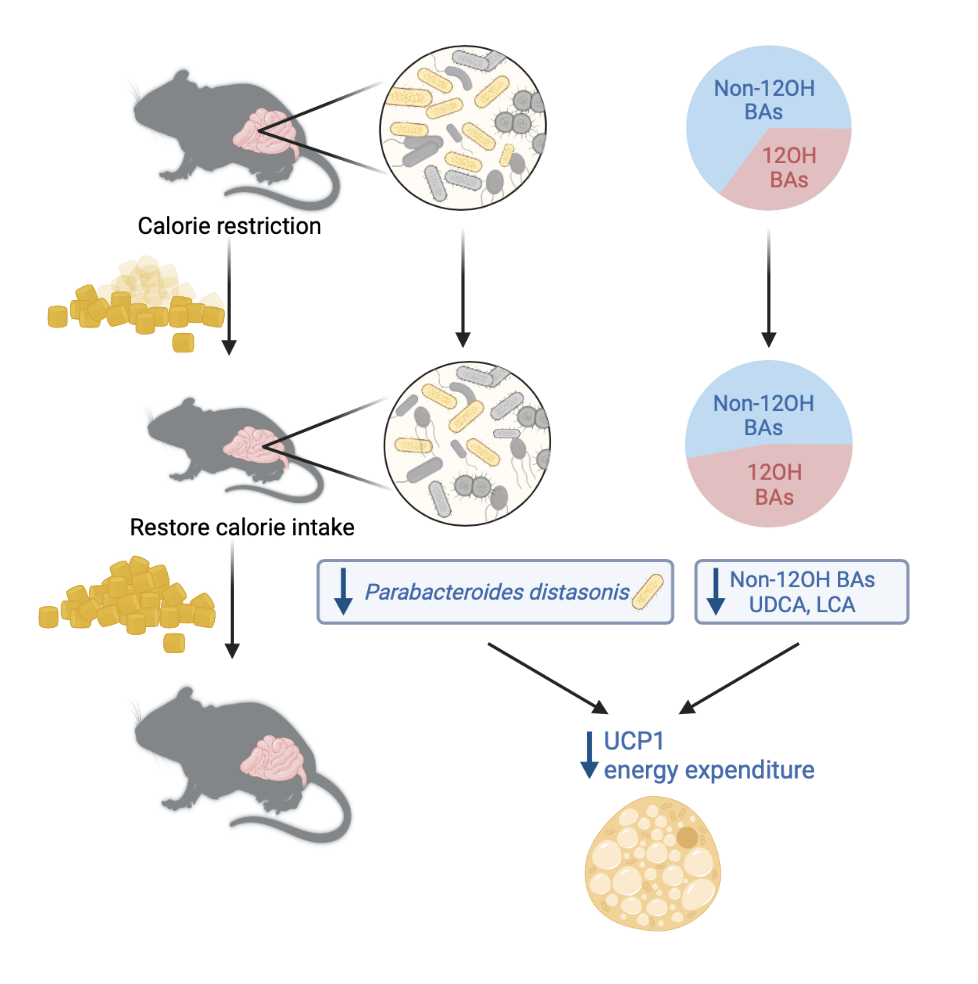News
Professor Jia Wei's team identifies the critical role of gut microbiota-bile acid crosstalk in mediating rebound weight gain after calorie restriction
29 Apr 2022
A study led by Professor Jia Wei, Cheung On Tak Endowed Professor in Chinese Medicine and Associate Dean (International Collaboration) of Chinese Medicine, has revealed the critical role of the crosstalk between gut microbiota and bile acid in modulating rebound weight gain after calorie restriction (CR). The study found that CR decreased the content of probiotic Parabacteroides distasonis in gut microbiota and the proportion of non-12α-hydroxylated bile acids (non-12αOHBAs), leading to reduced energy expenditure and weight regain. It also demonstrated that supplementation with Parabacteroides distasonis or ursodeoxycholic acid (UDCA, a kind of non-12αOHBAs) could attenuate post-CR weight regain. These research findings have recently been published in the international scientific journal Nature Communications.
CR reduces energy expenditure
The research team adopted a fasting mouse model and CR mouse model to investigate how dietary intervention modulates weight regain. By analysing the metabolic phenotypes of the two mouse models, they found that body weight was significantly increased accompanied with glucose intolerance and insulin resistance after transition from CR to normal diet. Meanwhile, CR mice showed lower energy expenditure as well as more severe hepatic steatosis and adipocyte hypertrophy compared with the control mice.
CR remodels the gut microbial ecosystem and bile acid composition
The research team conducted a whole-genome shotgun metagenomic sequencing in the two above-mentioned mouse models and found that the ratio of Firmicutes to Bacteroidetes was increased significantly after CR, which could possibly be the key regulator for weight regain. They further discovered that the abundance of Parabacteroides distasonis and the proportion of non-12αOHBA, especially lithocholic acid and UDCA, were significantly decreased in CR group. Using generalised correlation analysis for metabolome and microbiome (GRaMM), they found that Parabacteroides distasonis had a strong correlation with most non-12αOHBA.
Treatment with Parabacteroides distasonis or UDCA prevents weight regain after CR diet
Their further studies showed that supplementation with Parabacteroides distasonis or UDCA significantly ameliorated weight regain in mice with CR. Mechanically, the research team proved that non-12αOHBAs activated the TGR5-UCP1 signalling pathway in brown adipose tissue (BAT), maintaining the normal energy expenditure and weight control.
Taken together, this study has revealed the critical role and mechanism of gut microbiota-bile acid crosstalk in rebound weight gain after CR. Meanwhile, Parabacteroides distasonis has been identified as an effective nutritional supplement for combating weight regain resulted from CR-induced alterations in gut microbiome composition, making it a promising novel therapeutic agent for the prevention of obesity.

